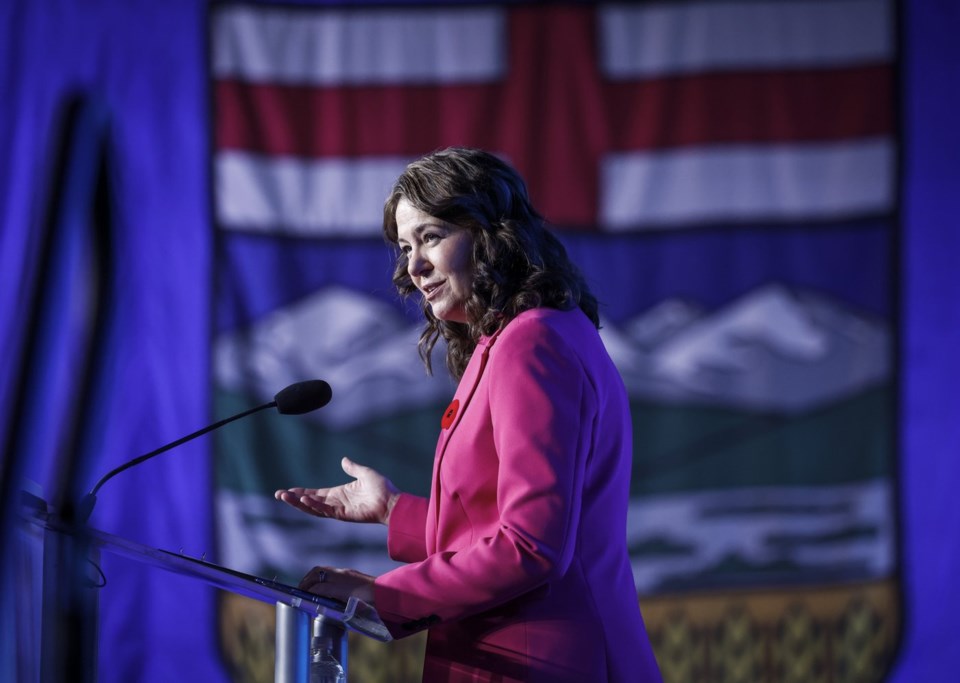EDMONTON — Alberta Premier Danielle Smith says the province had taxpayers in mind when it decided to lift a ban on new coal exploration and development on the eastern slopes of the Rocky Mountains.
Speaking to reporters Tuesday, Smith cited lawsuits against the province filed by five coal companies arguing they are owed more than $15 billion combined in lost revenues and sunk costs.
"We have to take that seriously, and we have to make sure that the taxpayers are protected," Smith said.
Alberta repealed its decades-old coal policy and issued new leases in 2020, only to put nearly all new projects on ice two years later with a moratorium that followed a storm of public pushback.
A small number of advanced projects were exempted from the moratorium.
The sudden freeze on coal exploration and development meant companies that heeded the government's policy direction and purchased new leases for potential mining found themselves stuck with land they couldn't use.
Last week, Energy Minister Brian Jean sent a letter to the Alberta Energy Regulator directing the moratorium on new coal development be lifted, allowing previously frozen projects to proceed through the regulatory process.
Jean's office said Monday that lifting the moratorium doesn't mean the government has declared open season for coal mining, as critics suggest, but reduces regulatory confusion.
The minister's office said the regulator will need to keep in mind the goals of the government's new policy, which Jean announced in December, as it reviews projects.
The policy direction includes a ban on certain types of coal mining techniques, such as open-pit mining, as well as a requirement that companies show how they can prevent toxic selenium from leaching into watersheds.
"We're bringing through a better, more robust policy, and so that's part of the reason why we put that forward," said Smith, adding the policy addresses concerns Albertans shared after the previous one was rescinded.
NDP Leader Naheed Nenshi said the United Conservative Party government put the province in the position of choosing between exposing itself to environmental or legal risks.
"That ridiculous mistake of lifting (the existing coal policy) and then reversing it is what led to these lawsuits," Nenshi said. "So now the premier has reversed it again because of the lawsuits caused by the UCP's own incompetence."
Meanwhile, Smith said accessing Alberta's stock of metallurgical coal would be a good thing.
"You just cannot make wind turbines and solar panels without metallurgical coal," she said.
"We can address the environmental concerns, but we have to be prepared to work with industry partners so that we can get these things developed."
Glenn Vassallo, the head of corporate and project finance for Valory Resources, one of the companies suing the province, applauded the removal of the moratorium.
"These decisions by the Alberta government provide an incredible opportunity for Alberta to build a world-class underground steelmaking coal industry, using modern technology which is safe, efficient and environmentally friendly," Vassallo said in an email.
Vassallo said he couldn't comment on what the government's decision means for the lawsuit.
Peter Doyle, the CEO of Montem Resources, which is also suing the province, said in an email that lifting the moratorium does nothing to stop it from seeking costs in court.
"If the government really cares about protecting taxpayers and generating investment in a steelmaking coal industry in Alberta, they should come to the table to settle the lawsuits and pay fair compensation for the property they’ve expropriated," Doyle said.
Alberta country singer Corb Lund, an outspoken critic of coal mining in the eastern slopes, said there will still be a price to pay even if the government's decision staves off damages sought by the coal companies.
"So in exchange for keeping their eggs off their face, they're sacrificing our eastern slopes and our water," Lund said in an interview.
"Whatever it costs in court is a tiny, tiny fraction of what it's going to cost the taxpayers years from now to clean this mess up."
Lund said he had no confidence the government's policy would accomplish what Jean and Smith say it will.
"All they care about is protecting their own butts and pleasing the coal companies," Lund said.
"People in southern Alberta need take a really hard look at this if they want to keep their water clean."
The end of the moratorium comes as the Alberta Energy Regulator reviews a contentious open-pit coal mine project proposed by Northback Holdings in southwestern Alberta's Crowsnest Pass.
The Grassy Mountain project was one of the few projects deemed advanced when the moratorium was imposed. Jean said in December the ban on open-pit mining wouldn't apply in this case.
In a non-binding referendum last year in Crowsnest Pass, 72 per cent of those who cast ballots were in favour of the project proceeding.
"This is how our community feels and we will continue pushing forward," said Mayor Blair Painter.
He said with the moratorium being lifted, "I would certainly hope that will help with the project."
Public hearings wrapped up last week and the regulator is expected to release a decision on Grassy Mountain within 90 days.
Northback Holdings did not immediately respond to questions about what lifting the moratorium means for the project or its lawsuit against the province.
Painter said the lifting of the moratorium is unlikely to open the door to more coal projects in the Crowsnest.
He said Tent Mountain was the only other legacy coal mine in the area, and it ceased operations in 1983. Some other projects north of the area might benefit, he said, but coal mining is still a sensitive issue.
"Everybody has concerns,” Painter said. “Water is vital.”
— With files from Lisa Johnson in Edmonton and Bill Graveland in Calgary
This report by The Canadian Press was first published Jan. 21, 2025.
Jack Farrell, The Canadian Press

